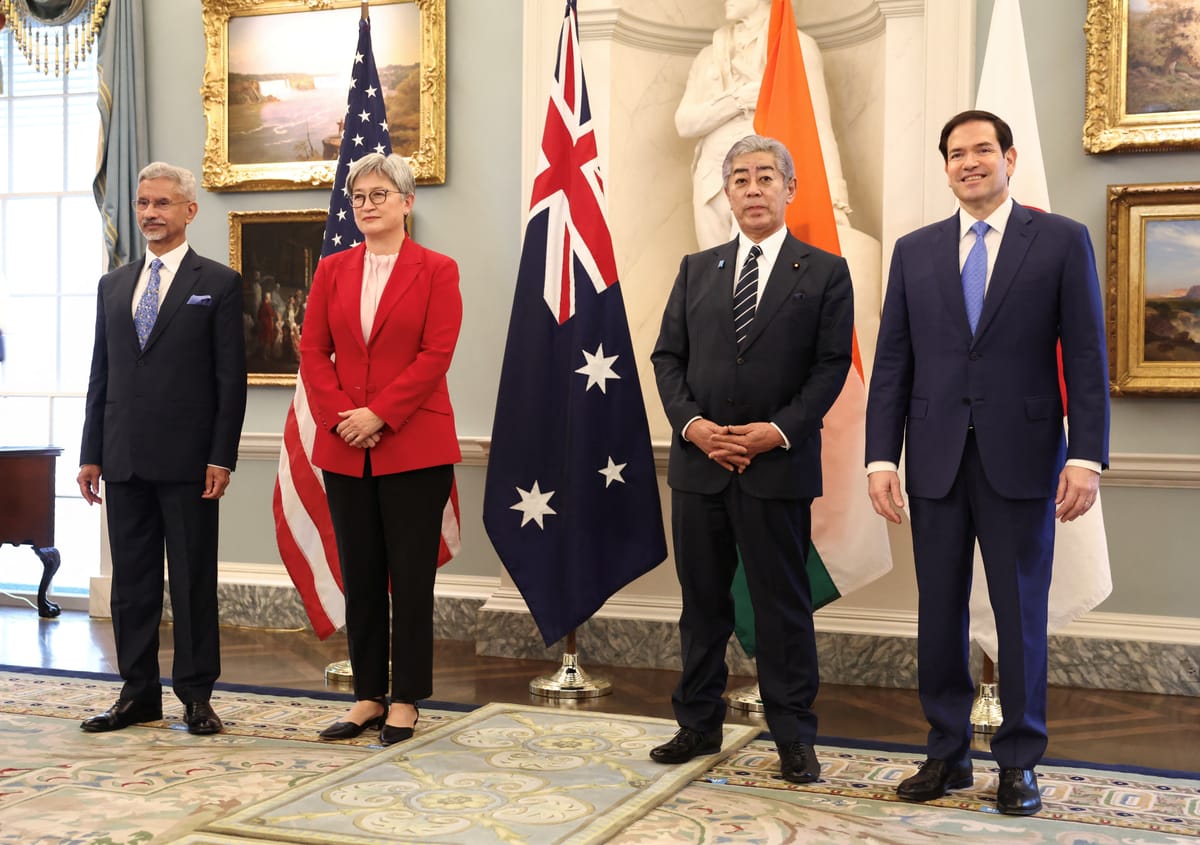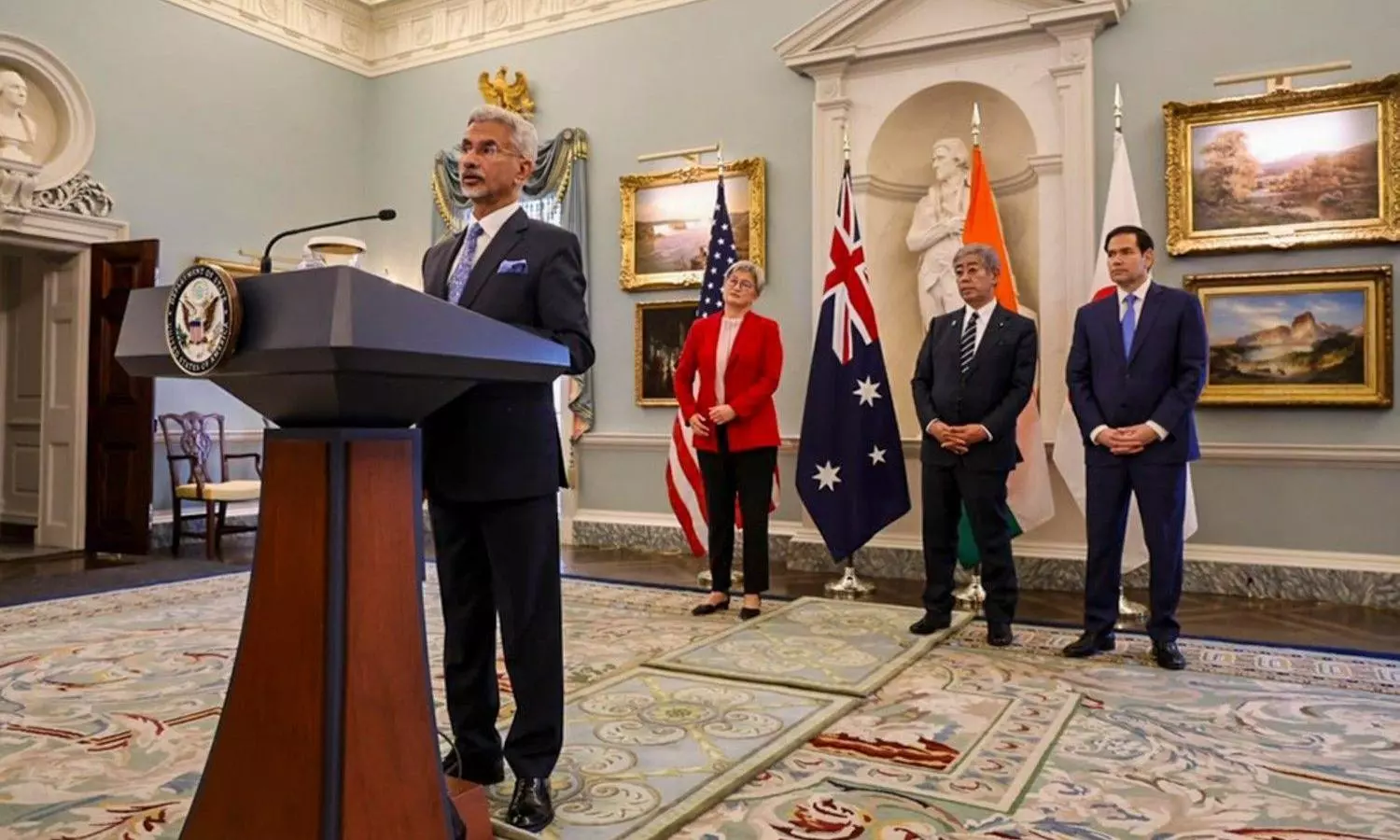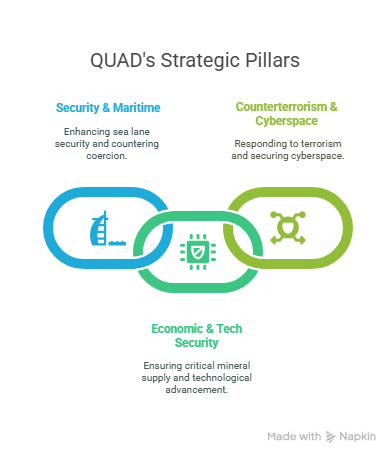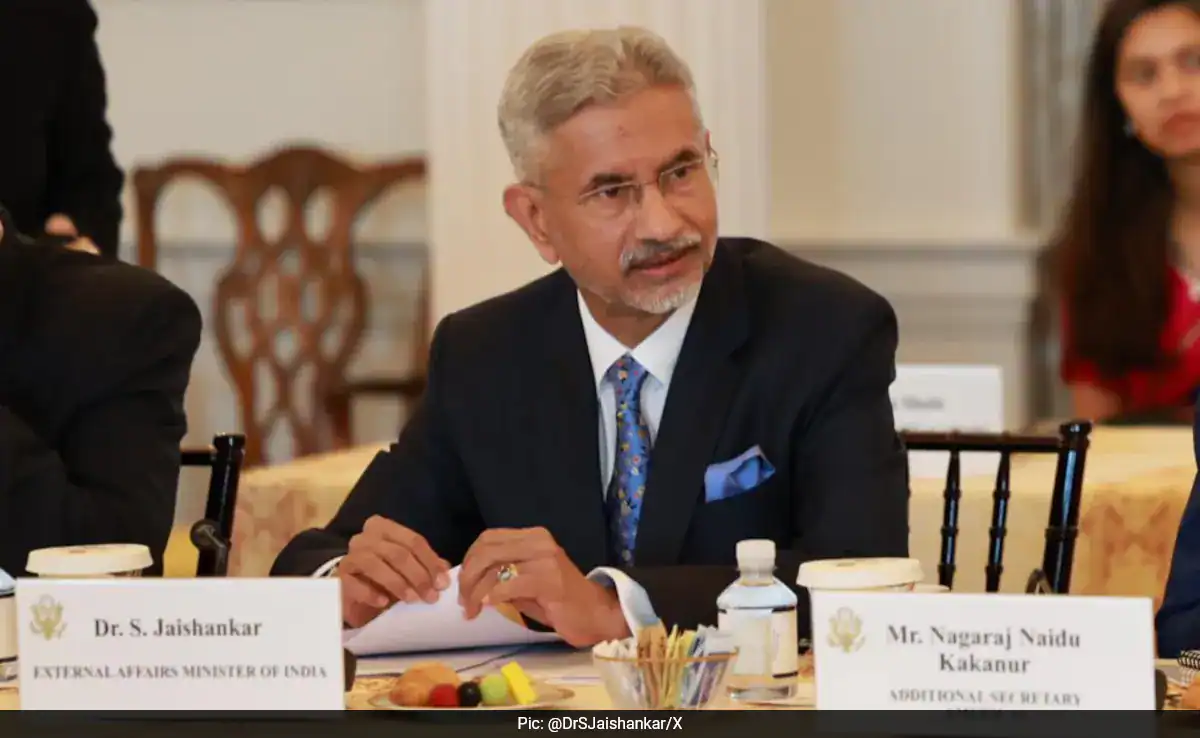Why the 2025 QUAD Foreign Ministers’ Meeting Matters for India’s Global Image and Regional Clout
EAM Jaishankar leads India's push at the 2025 QUAD summit in Washington, exploring maritime security, tech partnerships, anti-terrorism, and democratic alliances.

Washington, D.C., July 2, 2025
The 2025 QUAD Foreign Ministers’ Meeting in Washington is an important diplomatic event for India. External Affairs Minister S. Jaishankar is joining U.S. Secretary of State Marco Rubio, Australia’s Penny Wong, and Japan’s Takeshi Iwaya. The summit aims to move QUAD from mere statements to real strategic actions in three key areas: maritime security, economic and technological cooperation, and counterterrorism. It strengthens India’s changing global position, commitment to democracy, and vision for the Indo-Pacific region. Let’s look at how this meeting might change India’s international reputation and influence.
Summit Snapshot: Dates, Attendees, and Objectives
Dates: June 30 - July 2, 2025
Location: Washington, D.C.
Participants:
- India: EAM S. Jaishankar
- USA: Secretary of State Marco Rubio
- Australia: FM Penny Wong
- Japan: FM Takeshi Iwaya
Key Agenda Themes:
Security & Maritime: Stabilizing the Indo-Pacific and countering coercive actions in the South and East China Seas.
Economic & Tech: Launch of the "Quad Critical Minerals Initiative" and strategies for semiconductors and AI.
Counterterrorism: Joint condemnation of the Pahalgam terror attack and support for India’s right to self-defense.
India’s Agenda: Sovereignty, Security, Strategic Depth
Assertive Counterterrorism
Jaishankar noted, “The world must display zero tolerance. Victims and perpetrators must never be equated. India has every right to defend its people.” This statement follows India’s Operation Sindoor after the Pahalgam attack, showing a clear stance on sovereignty and self-defense.
Maritime Domain Awareness
India aims to enhance its role in Indo-Pacific Maritime Domain Awareness (IP-MDA) through naval drills and integrating military platforms. Jaishankar stressed the QUAD’s development toward achieving "practical outcomes."
Tech & Economic Security
Rubio and Jaishankar pointed out the need to diversify critical mineral supply chains, directly challenging China’s control. India is also focusing on semiconductor production, especially in Tamil Nadu, which signals deeper ties in technology diplomacy.
Infrastructure and Sovereign Collaboration
India is pushing for transparent and sustainable infrastructure options to China’s Belt and Road Initiative, which covers ports, green energy, and logistics corridors.
Dr. S. Jaishankar (India's External Affairs Minister) quoted, “The world must display zero tolerance. Victims and perpetrators must never be equated. India has every right to defend its people.”

QUAD in Transition: From ‘Talk Shop’ to ‘Action Platform’
Critics have often labeled QUAD as a high-profile group that lacks substance. However, recent developments indicate real progress.
The Quad Critical Minerals Initiative has launched to support secure and resilient supply chains.
Efforts are underway to explore cyber-coordination and maritime data integration.
Standard operating procedures for Humanitarian Assistance & Disaster Relief (HADR) have been established, serving as a key delivery mechanism.
There is a shared disapproval of North Korea’s missile and cyber actions, as well as condemnation of those involved in the Pahalgam attack.
Reuters mentions that tensions over tariffs and AUKUS between the U.S.-Japan and U.S.-Australia may overshadow the summit, but they will not derail it. Rubio reinforced the need for QUAD to function as an "action vehicle."
Three Frontline Challenges Addressed by QUAD

“Australia is committed to working with partners who believe in transparency, sovereignty, and resilience. The Indo-Pacific must remain free and open.” - Penny Wong (Australian Foreign Minister)
Jaishankar’s Diplomatic Posture: The Art of Subtle Strength
EAM Jaishankar’s involvement highlights a sophisticated mix of:
- Firm Sovereignty Messaging: “Zero tolerance… India expects understanding.”
- Strategic Posturing: Promoting SAGAR, IP-MDA, and a non-aligned approach.
- Tech-Diplomatic Leadership: Steering QUAD towards high-end semiconductors and AI regulation.
- Coalition Building With Autonomy: Forming democratic partnerships while maintaining independence and involving ASEAN, Africa, BRICS, and I2U2.
Tech, Infrastructure & Economic Cohesion
The 2025 summit emphasizes hard infrastructure:
- Initiative Highlights:
- Critical Minerals Initiative: Responding to resource vulnerability.
- Quad Infrastructure Fellowship and HADR SOPs: Actual implementations are in progress.
- India-Japan-U.S. Trilateral Projects: Semiconductor plants and green port upgrades in Southeast Asia, providing transparent alternatives to BRI.
- Digital & Tech Governance Collaboration: Shared frameworks for AI, cybersecurity standards, and Open-RAN networks are rolling out, including projects in Palau and Mauritius.

India’s Diplomatic Balancing Act in Multipolar Great Power Dynamics
India is managing a delicate balance:
- Defensive Hard Power: HADR, naval exercises, and cybersecurity.
- Pragmatic Partnerships: Collaborations with Quad, ASEAN, IORA, PIF, and I2U2 for global outreach.
- Strategic Autonomy: Building democratic relationships without formal bloc commitments, ensuring policy flexibility.
- Global Bloc Management: Engaging with QUAD while maintaining a range of geopolitical ties.
Ashley Tellis (Foreign Policy Expert, Carnegie Endowment) emphasized, “India’s strategic autonomy has evolved—not into isolation, but into multi-alignment. QUAD fits that mold perfectly.”
What India Gains—and Risks—Through This Summit
Gains
Enhanced Global Visibility: Moving from an observer to a central figure in QUAD.
Normative Democratic Alignment: Sharing values enhances India’s global standing.
Geostrategic Leverage: Boosting maritime control and technological strength.
Economic Security: Less vulnerability to supply chain disruptions.
Risks
China–Pakistan Response: Possible strategic backlash from neighboring countries.
Strategic Commitments: Greater commitments may limit India’s policy flexibility.
Internal Tensions: Differing interests among Quad partners related to tariffs and AUKUS could complicate unified objectives.
Post-Summit Trajectory: Implementation & The Road Ahead
Next Steps:
- India will host the QUAD Leaders’ Summit later in 2025.
- Launch regional corridors and green infrastructure projects.
- Implement tech, semiconductor, and cybersecurity frameworks at full scale.
- Conduct HADR tabletop exercises and engage in ASEAN-Quad dialogues and I2U2 alignment.
A crucial test lies ahead: Can India operationalize these alliances while retaining strategic independence and gaining regional goodwill?

Final Reflections: Strategic Autonomy in Action
The 2025 QUAD meeting holds vital importance for India. It presents a united democratic front, builds solid cross-national safeguards, and strengthens India’s strategic position. Jaishankar’s skillful diplomacy aims to advance autonomy while supporting multilateral goals. The focus now turns to implementation: how these agreements will play out in maritime contexts, supply chains, and in tandem with democratic partners.
Your Opinion:
Do you think India’s strong involvement in QUAD will promote regional stability without sacrificing its strategic independence? Or will it shift towards bloc politics? Share your thoughts below.
Sources
- News Reports: Coverage from AP News, Reuters, India Today, NDTV, and The New Indian Express on the 2025 QUAD summit and ministerial statements.
- Official Quotes: Statements by Dr. S. Jaishankar, Marco Rubio, Penny Wong, and Takeshi Iwaya sourced from verified press conferences and media reports.
- Expert Opinions: Insights from Ashley Tellis (Carnegie Endowment) and Michael Green (US Studies Centre) cited from foreign policy commentaries.
- Visuals & Media: Images taken from NDTV, SocialNews.XYZ, IndianNewEngland.com, The Federal, Times Now, and SouthAsianHerald.com showcase summit proceedings.
- Government and Think Tank Sources: Policy references cross-checked with Carnegie India, The Hindu, and Indian Defence News portals.
- Geopolitical Data: Strategic frameworks like the Indo-Pacific Maritime Domain Awareness (IP-MDA) and Critical Minerals Initiative were verified via Quad joint statements.




